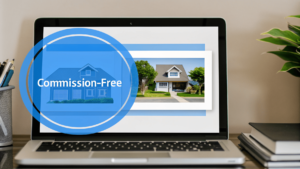We don’t talk about this enough in real estate: owning a home can be both a dream come true and a financial trap. I’ve worked with smart, financially responsible clients who still wound up “house poor”—and it’s not always because they were reckless. Sometimes, the system encourages it. But if we get honest about what this means and how it happens, we can take steps to avoid it altogether
Table of Contents
ToggleHow Smart Buyers Still Fall Into the House Poor Trap
A recent Yahoo Finance article (June 2025) spotlighted a financial trap many homeowners fall into: becoming house poor. That’s when your housing costs—mortgage, taxes, insurance, maintenance—consume so much of your income that you’re left with little for savings, emergencies, or even daily life. It’s a timely warning, especially as buyers stretch to afford homes amid high prices and lingering inflation.
What Buyers Need to Know About Being House Poor
1. Approval Doesn’t Equal Affordability
Just because a lender approves you for a $500,000 mortgage doesn’t mean you should take it. Lenders use formulas that often overlook lifestyle spending, childcare costs, or emergency funds. I always tell clients: your actual budget isn’t what the bank says—it’s what your life says.
Rule of thumb: Keep total housing costs under 28% of your gross monthly income.
2. Your Mortgage is Only the Beginning
First-time buyers often fixate on the monthly mortgage. But there’s more under the hood—property taxes, homeowners insurance, maintenance, HOA fees, utilities. A $3,200 mortgage can feel doable until you factor in a new HVAC, a leaking roof, or skyrocketing insurance premiums. Think of it like buying a car—you wouldn’t budget for just the car payment and ignore fuel, repairs, and insurance.
3. The Emotional Cost is Real
Being house poor doesn’t just impact your bank account—it affects your health. I’ve seen clients lose sleep, delay doctor visits, or give up family vacations just to stay afloat. Homeownership should feel secure and empowering, not like walking a financial tightrope every month.
4. It’s Not Always Your Fault
In today’s market, many buyers feel they have to stretch or be priced out. But stretching can backfire. If interest rates spike or income changes, a “dream home” quickly becomes a burden. It’s not about discipline—it’s about designing a sustainable lifestyle.
How to Stay Smart—and Safe—When Buying a Home
Here’s what I recommend to buyers, sellers, and current homeowners:
For Buyers:
- Know your true budget. Don’t just accept the bank’s max approval. Use mortgage affordability calculators and budget tools to see what fits your lifestyle.
- Plan for maintenance. Assume at least 1% of the home’s value per year in upkeep. That $400,000 home? Budget $4,000 annually.
- Leave space to breathe. If stretching means sacrificing your savings, travel, or peace of mind, it’s not worth it. A smaller home can offer bigger financial comfort.
For Current Homeowners Feeling the Pinch:
- Reassess your monthly spending. Cut back where you can and consider debt consolidation for high-interest bills.
- Look into refinancing. If rates have dropped or your credit has improved, you may be able to lower monthly payments—just don’t forget closing costs.
- Explore renting a room or part-time gig income. Even short-term boosts can help ease the pressure.
- Downsizing is not failure. Selling and moving into a more affordable place can be the smartest move for long-term wealth and mental health.
Quick Explainer: What Does It Mean to Be House Poor?
What is “house poor”?
Being house poor means your housing expenses take up so much of your income that there’s little left for savings, emergencies, or living expenses—even if you earn a decent salary.
A Tool That Helps You Plan Smarter
If you’re unsure how much home you can truly afford, I recommend using a house affordability calculator alongside a debt-to-income ratio tool. They give you a clearer picture than a preapproval letter ever could.
These online tools help you simulate real-life spending so you can test “what if” scenarios before committing.
Reader Q&A
Should I still buy if rates are high but I found the perfect house?
Only if the total monthly costs—including taxes, insurance, and maintenance—still fit within your long-term budget. A dream home that stresses your finances can quickly become a nightmare.
Can I become house poor even if I make six figures?
Absolutely. Income doesn’t protect you from being overextended—especially in high-cost housing markets. The issue is percentage spent, not just total dollars earned.
Is it smarter to rent until I’m financially stronger?
In many cases, yes. Renting temporarily while building savings or improving your credit can put you in a far better position for a successful purchase later.
Final Thought:
Owning a home should feel like a foundation—not a financial trap. Whether you’re a first-time buyer or a seasoned homeowner, take a breath, look at the full picture, and choose the path that lets you live, not just survive

